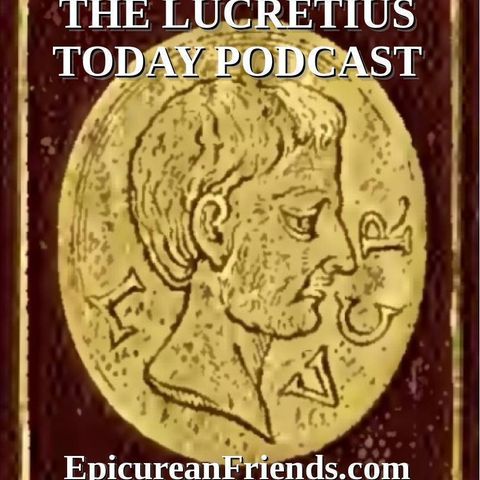Episode 250 - Cicero's OTNOTG 25: The Relationship of "Images" To All Human Thought - Not Just To "The Gods"

Download and listen anywhere
Download your favorite episodes and enjoy them, wherever you are! Sign up or log in now to access offline listening.
Episode 250 - Cicero's OTNOTG 25: The Relationship of "Images" To All Human Thought - Not Just To "The Gods"
This is an automatically generated transcript. Please note that complete accuracy is not guaranteed.
Description
Welcome to Episode 250 of Lucretius Today. This is a podcast dedicated to the poet Lucretius, who wrote "On The Nature of Things," the most complete presentation of Epicurean philosophy...
show moreXXXVII.
... for you asserted likewise that the form of the Deity is perceptible by the mind, but not by sense; that it is neither solid, nor invariable in number; that it is to be discerned by similitude and transition, and that a constant supply of images is perpetually flowing on from innumerable atoms, on which our minds are intent; so that we from that conclude that divine nature to be happy and everlasting.
XXXVIII. What, in the name of those Deities concerning whom we are now disputing, is the meaning of all this? For if they exist only in thought, and have no solidity nor substance, what difference can there be between thinking of a Hippocentaur and thinking of a Deity? Other philosophers call every such conformation of the mind a vain motion; but you term it “the approach and entrance of images into the mind.” Thus, when I imagine that I behold T. Gracchus haranguing the people in the Capitol, and collecting their suffrages concerning M. Octavius, I call that a vain motion of the mind: but you affirm that the images of Gracchus and Octavius are present, which are only conveyed to my mind when they have arrived at the Capitol. The case is the same, you say, in regard to the Deity, with the frequent representation of which the mind is so affected that from thence it may be clearly understood that the Gods are happy and eternal.
Let it be granted that there are images by which the mind is affected, yet it is only a certain form that occurs; and why must that form be pronounced happy? why eternal? But what are those images you talk of, or whence do they proceed? This loose manner of arguing is taken from Democritus; but he is reproved by many people for it; nor can you derive any conclusions from it: the whole system is weak and imperfect. For what can be more improbable than that the images of Homer, Archilochus, Romulus, Numa, Pythagoras, and Plato should come into my mind, and yet not in the form in which they existed? How, therefore, can they be those persons? And whose images are they? Aristotle tells us that there never was such a person as Orpheus the poet; and it is said that the verse called Orphic verse was the invention of Cercops, a Pythagorean; yet Orpheus, that is to say, the image of him, as you will have it, often runs in my head. What is the reason that I entertain one idea of the figure of the same person, and you another? Why do we image to ourselves such things as never had any existence, and which never can have, such as Scyllas and Chimæras? Why do we frame ideas of men, countries, and cities which we never saw? How is it that the very first moment that I choose I can form representations of them in my mind? How is it that they come to me, even in my sleep, without being called or sought after?
XXXIX. The whole affair, Velleius, is ridiculous. You do not impose images on our eyes only, but on our minds. Such is the privilege which you have assumed of talking nonsense with impunity. But there is, you say, a transition of images flowing on in great crowds in such a way that out of many some one at least must be perceived! I should be ashamed of my incapacity to understand this if you, who assert it, could comprehend it yourselves; for how do you prove that these images are continued in uninterrupted motion? Or, if uninterrupted, still how do you prove them to be eternal? There is a constant supply, you say, of innumerable atoms. But must they, for that reason, be all eternal? To elude this, you have recourse to equilibration (for so, with your leave, I will call your Ἰσονομία), and say that as there is a sort of nature mortal, so there must also be a sort which is immortal. By the same rule, as there are men mortal, there are men immortal; and as some arise from the earth, some must arise from the water also; and as there are causes which destroy, there must likewise be causes which preserve. Be it as you say; but let those causes preserve which have existence themselves. I cannot conceive these your Gods to have any. But how does all this face of things arise from atomic corpuscles? Were there any such atoms (as there are not), they might perhaps impel one another, and be jumbled together in their motion; but they could never be able to impart form, or figure, or color, or animation, so that you by no means demonstrate the immortality of your Deity.
Information
| Author | Cassius Amicus |
| Organization | Cassius Amicus |
| Website | - |
| Tags |
-
|
Copyright 2024 - Spreaker Inc. an iHeartMedia Company

Comments